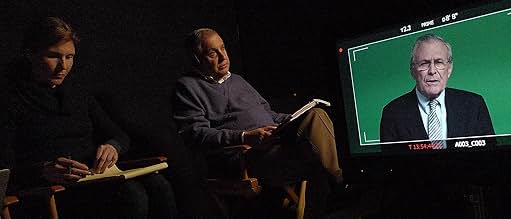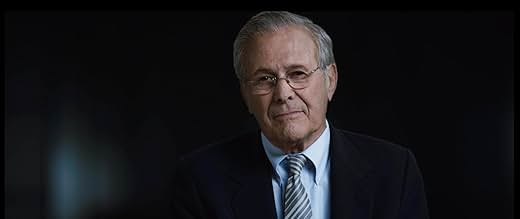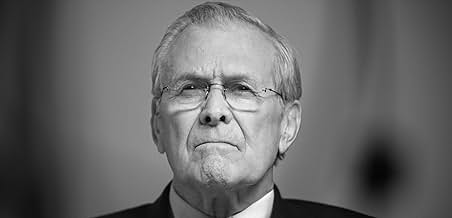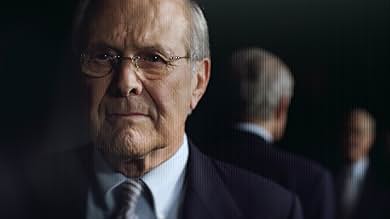IMDb RATING
7.0/10
4.4K
YOUR RATING
Former United States Secretary of Defense, Donald Rumsfeld, discusses his career in Washington D.C. from his days as a congressman in the early 1960s to planning the invasion of Iraq in 2003... Read allFormer United States Secretary of Defense, Donald Rumsfeld, discusses his career in Washington D.C. from his days as a congressman in the early 1960s to planning the invasion of Iraq in 2003.Former United States Secretary of Defense, Donald Rumsfeld, discusses his career in Washington D.C. from his days as a congressman in the early 1960s to planning the invasion of Iraq in 2003.
- Director
- Writer
- Stars
- Awards
- 2 wins & 10 nominations total
- Director
- Writer
- All cast & crew
- Production, box office & more at IMDbPro
Featured reviews
I have rarely been so perplexed by a documentary film as by this one. It is 102 minutes long, and for much of that time Donald Rumsfeld is talking to the director/interviewer Errol Morris. However, despite that, I now feel that I know less about Donald Rumsfeld than I did before I saw the film. I almost preferred him as an unknown unknown to what he now is, an unknown known. Rumsfeld manages to talk endlessly in what appears to be a very candid way, without ever really saying anything. A few salient facts do emerge, but only a few. The most surprising one to me was the revelation that he and George Bush Senior evidently detest one another, although Rumsfeld thinks very highly indeed of 'W'. I also did not realize until I saw this film that Rumsfeld and Dick Cheney are so close, and worked together for so many years, that they are like brothers. However, a slight trace of vanity appeared throughout the film as Rumsfeld was always very careful to describe Cheney on several occasions as 'my deputy'. Just in case little brother got any big ideas about forgetting who was the older brother, I suppose. Cheney was indeed Rumsfeld's deputy for a long time in office. When Cheney became Vice President, it was Cheney who recommended to George W. that Rumsfeld be made Secretary of Defence. So yes, some facts did emerge, and they are interesting. As for Rumsfeld himself, he remains an enigma in the highest degree. I was surprised to discover how astonishingly intelligent Rumsfeld was. One does not normally expect to find that in a public figure. But the most interesting aspect of Rumsfeld's personality is that a sense of ironical whimsicality seems to pervade everything he says, thinks, and does. Those grins that he makes are not normal grins, they are grins at the ironical whimsicality of situations and events. They are an invitation to those watching him to share his sense of irony and delight. Rumsfeld's grins do not say, as most grins do: 'Hello, I'm very friendly,' they say instead: 'Isn't that wonderfully whimsical, and don't you want to grin with me about it?' In other words, Rumsfeld is not like other men. I had no idea that Rumsfeld had commenced working in the executive branch of the Government during the Kennedy Administration, having previously been a congressman. This film says nothing whatever of his business activities, and does not mention his launching of the agricultural chemical spray Roundup upon the world, which in some opinions was an act more serious than the Iraq War, and may cause more deaths (deaths which cannot be defended on any 'just cause' basis, as the cause was only making money). No one could appear to cooperate more in making a film about himself than Donald Rumsfeld did, but the feeling afterwards is that he is a master at appearing to be transparent while all the while surrounding himself in a cloud of ink like an octopus. People often joke about eating Chinese food (in a bad Chinese restaurant), when they consume a lot but feel hungry immediately afterwards. Well! Where is the real meat on Rumsfeld, or is he all grissle? Nor is there any fat to chew on, only snowflakes. This man is a mystery, truly he is.
Donald Rumsfeld and Errol Morris are two senior men, not lacking success and self-esteem, Errol offering an audience and to Donald, to re-write his Historie.
What usually interests the film-maker is how people try so hard not to see the truth. Interesting angle. The movie was born from the numerous memos from Donald Rumsfeld, also a good Start!
The movie has a high quality production and the effects are great, the soundtrack is pervasive that is where all begins. It is produced like a Hollywood movie and formally gives the impressions of deepness. As spectator, it is embarrassing to see this long PR-Advertisement. Rumsfeld knows how to behave in front of a camera. He knows how to confuse, using pseudo-philosophical generalizations like The "unknown known". Unfortunately, the story-telling is full of inaccuracies and lies. The spectator is left alone, without anybody to counters or explains the infatuations of this guy.
Irak had been invaded because the FBI was delivering wrong information? I invite you to watch the movie "Fair Game" instead of "the Unknown Known" Rumsfeld pronounces the name of Dick Cheney, I would have wished his view about the privatization of the war through companies like Halliburton and Blackwater.
I wish I would have not seen this propaganda-movie. The only thing I learnt is to avoid the next movies from Errol Morris.
What usually interests the film-maker is how people try so hard not to see the truth. Interesting angle. The movie was born from the numerous memos from Donald Rumsfeld, also a good Start!
The movie has a high quality production and the effects are great, the soundtrack is pervasive that is where all begins. It is produced like a Hollywood movie and formally gives the impressions of deepness. As spectator, it is embarrassing to see this long PR-Advertisement. Rumsfeld knows how to behave in front of a camera. He knows how to confuse, using pseudo-philosophical generalizations like The "unknown known". Unfortunately, the story-telling is full of inaccuracies and lies. The spectator is left alone, without anybody to counters or explains the infatuations of this guy.
Irak had been invaded because the FBI was delivering wrong information? I invite you to watch the movie "Fair Game" instead of "the Unknown Known" Rumsfeld pronounces the name of Dick Cheney, I would have wished his view about the privatization of the war through companies like Halliburton and Blackwater.
I wish I would have not seen this propaganda-movie. The only thing I learnt is to avoid the next movies from Errol Morris.
Famously rigorous filmmaker Errol Morris sits a subject in front of him and the subject won't budge. This is, unfortunately, the takeaway from this documentary - a tremendous disappointment of a film in some way, but an extraordinary documentation of psychosis in another.
Rumsfeld apparently so annoyed Morris with his crafty replies that the director felt it necessary to follow up his film with a wild press tour apologizing for it - including a four part investigation into Rumsfeld's evasiveness in a New York times op-ed. In another article he called this film 'a horror movie'.
And it's understandable. Those who were against the wars in Iraq and Afghanistan will be infuriated- it gives us no new answers as to the motives behind the wars, no candid insights into Rumsfeld's tenure, and instead presents us with the same smirking blur of a man that we all got to know from his press conferences. Without a glint of uncertainty in his eye, he repeats essentially the same shtick as he always has. Direct questions are deflected with a grin and a wave.
Indeed, nobody deserves to be investigated more than Rumsfeld or his former compatriots, and Morris would ordinarily be the man to do it. But for an encounter to take place between two people, both need to be there. In this case one was absent. Those expecting a one on one - a whittling away towards the real substance - will leave empty handed because Rumsfeld is a ghost. There ain't nothing there. We've all been punk'd.
Rumsfeld apparently so annoyed Morris with his crafty replies that the director felt it necessary to follow up his film with a wild press tour apologizing for it - including a four part investigation into Rumsfeld's evasiveness in a New York times op-ed. In another article he called this film 'a horror movie'.
And it's understandable. Those who were against the wars in Iraq and Afghanistan will be infuriated- it gives us no new answers as to the motives behind the wars, no candid insights into Rumsfeld's tenure, and instead presents us with the same smirking blur of a man that we all got to know from his press conferences. Without a glint of uncertainty in his eye, he repeats essentially the same shtick as he always has. Direct questions are deflected with a grin and a wave.
Indeed, nobody deserves to be investigated more than Rumsfeld or his former compatriots, and Morris would ordinarily be the man to do it. But for an encounter to take place between two people, both need to be there. In this case one was absent. Those expecting a one on one - a whittling away towards the real substance - will leave empty handed because Rumsfeld is a ghost. There ain't nothing there. We've all been punk'd.
STAR RATING: ***** Saturday Night **** Friday Night *** Friday Morning ** Sunday Night * Monday Morning
Former US Secretary of Defence Donald Rumsfeld finds himself being grilled one on one by documentary maker Errol Morris in this follow up to his 2003 expose The Fog of War. A controversial figure as a result of being one of the key architects of the wars in Afghanistan and Iraq, Rumsfeld is called to defend his actions, and is put in the spotlight about some glaring inconsistencies in the thousands of memos, 'snowflakes', as he called them, that he was fond of writing that questioned the validity of the invasions. At the same time, Morris presents some of the background of his subject, from being the youngest and then the oldest holder of his post, as well as serving under no less than four US presidents.
Being remembered, as it will, as the first big war of the 21st century, the invasion of Iraq is still seen by many as a massive travesty, and a gross abuse of power, that many still want answers to. In some small way, Errol Morris here attempts a stab at this, by gaining access to one of the key figures at the heart of the matter. Throwing the spotlight completely on Rumsfeld, the man and his foibles are exposed for all to see, and with no escape. The title of the film is a part of one of the man's most confusing and tongue twisting uses of language, that probably makes a lot of sense to him, but just confuses (and infuriates) most others. He continues with this type of garble throughout, and often rounds it off with that questionable grin of his that will make him even harder to stomach for those already unconvinced by his rhetoric.
The film covers a lot of interesting ground, and has much back story to ponder over, but there's little to be distracted from than a man sitting down and talking to a camera, which is inevitably boring at times and causes your attention to wonder. It might also be a case of too much information to take in, at a running time stretching to just over an hour and a half. All the same, I can say I preferred it to The Fog of War, with Morris somehow managing to make it all just a little more digestible and affecting.
Rumsfeld doesn't come off as an entirely desirable guy, a man who clearly uses language designed to sound clever but obviously just with the purpose of confusing, whose nonsense is signed off with a patronising smile, and who leaves a lot of unanswered questions on the lips of those affected by the not completely kosher decisions he was part of making. For those who already weren't fond of him, it won't make them feel any better, whilst others will just see the man behind the suit, and have to make their own mind up. Morris has brought him out in a manner that has a lot of interesting material, but not the most thrilling execution. ***
Former US Secretary of Defence Donald Rumsfeld finds himself being grilled one on one by documentary maker Errol Morris in this follow up to his 2003 expose The Fog of War. A controversial figure as a result of being one of the key architects of the wars in Afghanistan and Iraq, Rumsfeld is called to defend his actions, and is put in the spotlight about some glaring inconsistencies in the thousands of memos, 'snowflakes', as he called them, that he was fond of writing that questioned the validity of the invasions. At the same time, Morris presents some of the background of his subject, from being the youngest and then the oldest holder of his post, as well as serving under no less than four US presidents.
Being remembered, as it will, as the first big war of the 21st century, the invasion of Iraq is still seen by many as a massive travesty, and a gross abuse of power, that many still want answers to. In some small way, Errol Morris here attempts a stab at this, by gaining access to one of the key figures at the heart of the matter. Throwing the spotlight completely on Rumsfeld, the man and his foibles are exposed for all to see, and with no escape. The title of the film is a part of one of the man's most confusing and tongue twisting uses of language, that probably makes a lot of sense to him, but just confuses (and infuriates) most others. He continues with this type of garble throughout, and often rounds it off with that questionable grin of his that will make him even harder to stomach for those already unconvinced by his rhetoric.
The film covers a lot of interesting ground, and has much back story to ponder over, but there's little to be distracted from than a man sitting down and talking to a camera, which is inevitably boring at times and causes your attention to wonder. It might also be a case of too much information to take in, at a running time stretching to just over an hour and a half. All the same, I can say I preferred it to The Fog of War, with Morris somehow managing to make it all just a little more digestible and affecting.
Rumsfeld doesn't come off as an entirely desirable guy, a man who clearly uses language designed to sound clever but obviously just with the purpose of confusing, whose nonsense is signed off with a patronising smile, and who leaves a lot of unanswered questions on the lips of those affected by the not completely kosher decisions he was part of making. For those who already weren't fond of him, it won't make them feel any better, whilst others will just see the man behind the suit, and have to make their own mind up. Morris has brought him out in a manner that has a lot of interesting material, but not the most thrilling execution. ***
Donald Rumsfeld, The Unknown Known, and his Lifetime of Service to War
The Unknown Known is the latest documentary from Errol Morris. Like his interviews with Robert McNamara in his film Fog of War, he interviews another architect of war, this time the Second Iraq War.
Unlike former Secretary of Defense Robert McNamara who pushed a continuation of the Vietnam conflict when he was in office, Donald Rumsfeld is not apologetic about his role in sending Americans off to die overseas. In his book In Retrospect, McNamara states in Time Magazine, "We were wrong, terribly wrong. We owe it to future generations to explain why."
Rumsfeld has no apologies to make, according to the man himself. And he learned no lesson from Vietnam except, as he would say, "it was a failure of imagination" that we lost in Vietnam.
Even Nixon apologized about his mistakes when talking to David Frost.
I am sure Director Morris was under legal contract not to ask tough, direct questions of Rumsfeld. Thus, he let Rumsfeld indict himself. Rumsfeld is narcissistic and unapologetic about the Second Iraq War. He sees no wrong in making the U.S. strong militarily regardless in how that strength is used. He does not, in The Unknown Known, see that the Second Iraq War was based on lies at all. He sees no lies. He submits that Saddam Hussein and Iraq did have WMDs, we just couldn't find them. He believes the U.N. weapons inspectors were duped and needed to keep looking. He does not agree that water boarding is torture, no matter what Human Rights Watch and others say. He sees know wrong except in our "failure of imagination."
Rumsfeld is a master of Newspeak, using phrases like "peace through strength", and "weakness is provocation." This all comes out in the movie, and it was no surprise to most of the audience. He lives in a world of lies, and the person he deludes the most is himself. Rating: Rent it. It is worth a view, and I would love to say that you should see it multiple times.
But there are no dramatic revelations in the movie, no sense of awaking. In fact, the lesson is that a beltway insider has many ways to deny the suffering of others, especially those we kill thousands of miles away for no cause. Rumsfeld sees war not as a destination, but a journey. As long as the U.S. stays on that journey, he is happy.
Peace, Tex Shelters
The Unknown Known is the latest documentary from Errol Morris. Like his interviews with Robert McNamara in his film Fog of War, he interviews another architect of war, this time the Second Iraq War.
Unlike former Secretary of Defense Robert McNamara who pushed a continuation of the Vietnam conflict when he was in office, Donald Rumsfeld is not apologetic about his role in sending Americans off to die overseas. In his book In Retrospect, McNamara states in Time Magazine, "We were wrong, terribly wrong. We owe it to future generations to explain why."
Rumsfeld has no apologies to make, according to the man himself. And he learned no lesson from Vietnam except, as he would say, "it was a failure of imagination" that we lost in Vietnam.
Even Nixon apologized about his mistakes when talking to David Frost.
I am sure Director Morris was under legal contract not to ask tough, direct questions of Rumsfeld. Thus, he let Rumsfeld indict himself. Rumsfeld is narcissistic and unapologetic about the Second Iraq War. He sees no wrong in making the U.S. strong militarily regardless in how that strength is used. He does not, in The Unknown Known, see that the Second Iraq War was based on lies at all. He sees no lies. He submits that Saddam Hussein and Iraq did have WMDs, we just couldn't find them. He believes the U.N. weapons inspectors were duped and needed to keep looking. He does not agree that water boarding is torture, no matter what Human Rights Watch and others say. He sees know wrong except in our "failure of imagination."
Rumsfeld is a master of Newspeak, using phrases like "peace through strength", and "weakness is provocation." This all comes out in the movie, and it was no surprise to most of the audience. He lives in a world of lies, and the person he deludes the most is himself. Rating: Rent it. It is worth a view, and I would love to say that you should see it multiple times.
But there are no dramatic revelations in the movie, no sense of awaking. In fact, the lesson is that a beltway insider has many ways to deny the suffering of others, especially those we kill thousands of miles away for no cause. Rumsfeld sees war not as a destination, but a journey. As long as the U.S. stays on that journey, he is happy.
Peace, Tex Shelters
Did you know
- TriviaThis same director also made Fog of War, a similar film that featured an extensive interview with Vietnam-era Secretary of Defense, Robert McNamara. Both films were highly critical of their lead subjects management of war.
- Crazy creditsIvan & Boris
- ConnectionsFeatured in At the Movies: Venice Film Festival 2013 (2013)
- SoundtracksWhite Christmas
Written by Irving Berlin
Performed by Tennessee Ernie Ford
Courtesy of Capitol Records Nashville under license from Universal Music Enterprises
- How long is The Unknown Known?Powered by Alexa
Details
- Release date
- Country of origin
- Language
- Also known as
- Donald Rumsfeld: certezas desconocidas
- Production companies
- See more company credits at IMDbPro
Box office
- Gross US & Canada
- $276,497
- Opening weekend US & Canada
- $64,315
- Apr 6, 2014
- Gross worldwide
- $301,604
- Runtime1 hour 43 minutes
- Color
- Sound mix
- Aspect ratio
- 2.35 : 1
Contribute to this page
Suggest an edit or add missing content

























